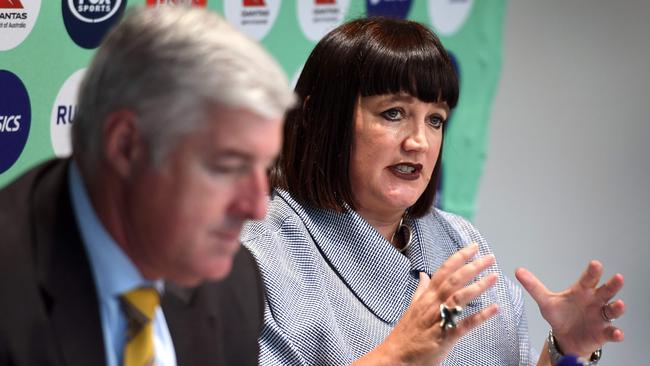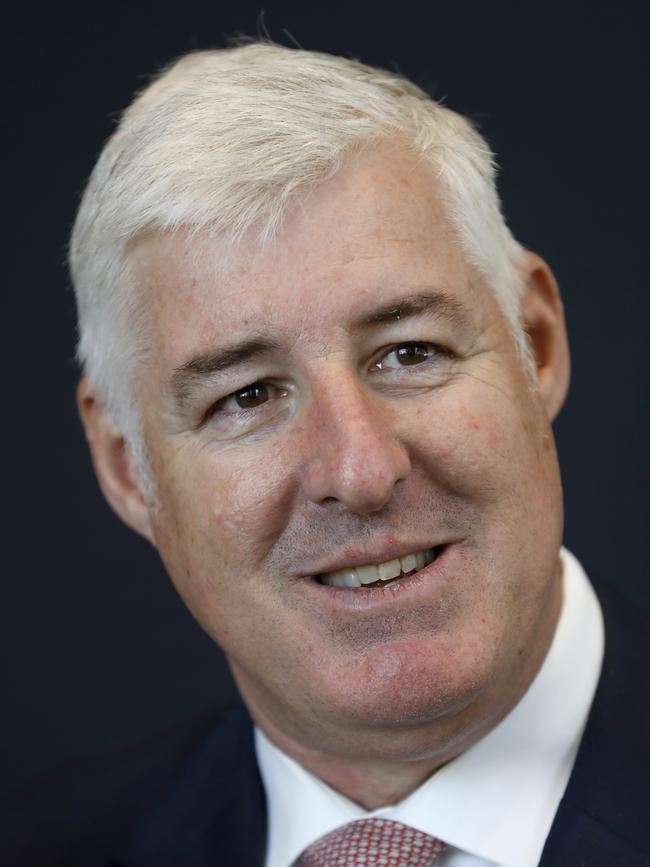Wallabies review panel to include an independent but won’t name new coach
Despite calls for her to quit, Rugby Australia boss will play key role on Wallabies’ performance panel.

At least one independent person will be named on the panel to review the Australian team’s performance before and during the Rugby World Cup, with a Rugby Australia spokesman insisting no new Wallabies coach would be appointed before the end of the tournament.
Although there have been widespread calls for the resignations of RA chairman Cameron Clyne and chief executive Raelene Castle following the Wallabies’ exit last Saturday at the quarter-final stage, it is planned that Castle will play a central role in the review, as indeed will RA director of rugby Scott Johnson.
As it is, the involvements of two RA executives who were both heavily involved in the Wallabies’ preparation will taint the review but the process has a chance to emerge with at least some legitimacy if RA also involves a credible, independent member.
Although the panel will not consider what candidates should be considered for the Australian coaching job, it will spend a considerable amount of time examining what the structure of the Wallabies coaching program was and how it needs to be improved.
- READ MORE: Alan Jones — Cheika bore burden alone | Lack of options kept Cheika in role | Cheika, Castle in ‘undignified clash’ | Clock ticks on Clyne reign
While RA is in no screaming rush to make a Wallabies coaching appointment, it cannot afford to dither much beyond the end of the World Cup on Saturday week, November 2. Already Japan have moved smartly to open negotiations with the current Brave Blossoms coach Jamie Joseph, one of the men listed as a possible Wallabies boss. The review is taking place against a backdrop of deep unrest in Australian rugby with Clyne reiterating a claim he has made many times before that he is prepared to vacate the chairmanship if RA members decide they want him out.
There have been rumbles of a possible coup, but there is no compelling evidence that either the directors or members are moving against Clyne. There is intense interest in the process outlined in The Australian on Thursday, with the nominations committee to come up with the names of three replacements for board members who have recently quit or will soon reach the end of their terms.

Those changes will happen at the annual general meeting in April, with one of the replacements expected to be a future RA chairman. The intention is not that Clyne will step down at the AGM but it is believed he would make a timely departure once his successor has been brought up to speed.
Still, coups don’t normally run to a “gentlemen’s agreement” timetable. The question remains whether the rugby public’s insistent calls for changes at the very top of RA will force critics to act sooner. It is understood that a vote of no-confidence in the board was narrowly averted earlier this year, though that disgruntlement was driven not by controversial issues but rather by financial concerns.
While Clyne has been forever tainted by the decision he drove to cull the Western Force from Super Rugby and Castle by the Israel Folau saga, generally speaking the chairman and the CEO are usually held accountable on two fronts — Australia’s performance at the World Cup and the nature of the game’s broadcast deal.
On the first count, they have clearly underperformed, although perhaps their greatest sin was in standing by while Wallabies coach Michael Cheika pursued running rugby to obscene lengths. Still, as is becoming increasingly evident by the day, Cheika stubbornly ran his own race and refused to take advice from anyone.
On the second count, the broadcast deal, the jury still is out but all the signs point to a likely drop in television revenue. The SANZAAR decision to cut the Sunwolves from Super Rugby was expected to be counterbalanced by the reduction of the competition to a more manageable and popular 14 teams, which would have made it possible for each side to play every other team.
Now, however, there is talk that Friday’s SANZAAR meeting in Tokyo will consider reinstating the Sunwolves, which would force the revival of the dreaded and deeply unpopular conference system. It’s a damned-if-you do, damned-if-you-don’t dilemma that SANZAAR somehow specialises in. Certainly, it would do nothing for Castle’s credibility if, after explaining why the Sunwolves had to be cut in the first place, she now had to give reasons why they had been brought back in.
One SANZAAR development, however, would be regarded as extremely popular. The organisation also is expected to look at whether Japan could be brought into The Rugby Championships as a fifth nation.
Certainly Australia and Argentina should support the proposal given that Japan were briefly ranked higher than the Wallabies and remain ahead of Los Pumas on the world rankings. But there is another factor to also consider: there could well be a tug-of-war between The Rugby Championship and the Six Nations to admit Japan.



To join the conversation, please log in. Don't have an account? Register
Join the conversation, you are commenting as Logout